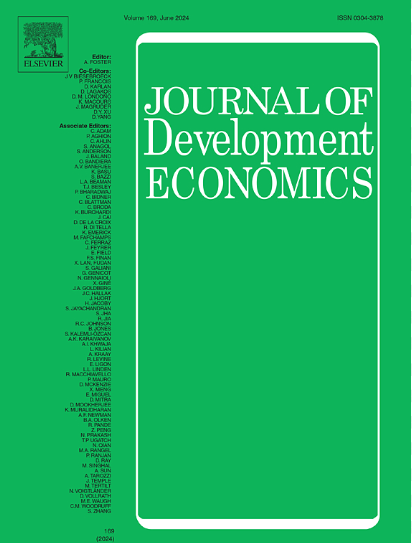Migration from developing countries: Selection, income elasticity, and Simpson’s paradox
IF 5.1
1区 经济学
Q1 ECONOMICS
引用次数: 0
Abstract
The economic causes and effects of migration from developing countries depend on patterns of self-selection that are difficult to observe. We estimate the degree of migrant self-selection—on both observed and unobserved determinants of income—for 99 developing countries using nationally representative survey data on 653,613 people. In low-income countries, people actively preparing to emigrate have 14 percent higher incomes explained by observed traits such as schooling, and 12 percent higher incomes explained by unobserved traits. The simulated income elasticity of emigration is positive in the aggregate (+0.23) despite being negative in subpopulations, an instance of Simpson’s paradox.
来自发展中国家的移民:选择、收入弹性和辛普森悖论
发展中国家移民的经济原因和影响取决于难以观察到的自我选择模式。我们利用具有全国代表性的 653,613 人的调查数据,估算了 99 个发展中国家的移民自我选择程度--包括观察到的和未观察到的收入决定因素。在低收入国家,积极准备移居国外的人,其收入有 14% 是由学校教育等观察到的特征决定的,有 12% 是由未观察到的特征决定的。移民的模拟收入弹性在总体上是正的(+0.23),尽管在亚人群中是负的,这是辛普森悖论的一个实例。
本文章由计算机程序翻译,如有差异,请以英文原文为准。
求助全文
约1分钟内获得全文
求助全文
来源期刊

Journal of Development Economics
ECONOMICS-
CiteScore
8.30
自引率
4.00%
发文量
126
审稿时长
72 days
期刊介绍:
The Journal of Development Economics publishes papers relating to all aspects of economic development - from immediate policy concerns to structural problems of underdevelopment. The emphasis is on quantitative or analytical work, which is relevant as well as intellectually stimulating.
 求助内容:
求助内容: 应助结果提醒方式:
应助结果提醒方式:


